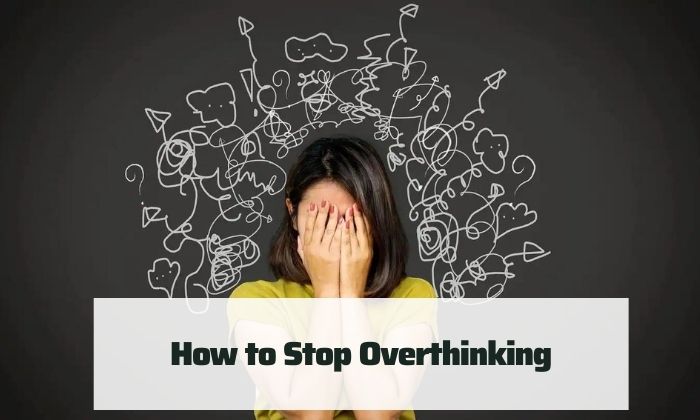How to Stop Overthinking – 10 Simple Tips

It is exhausting to overthink. When you overthink, your thoughts run circles in your head and you become stuck in reverse, unable to move forward. Furthermore, you begin to have bizarre ideas that are diametrically opposed to one another.
“I’m so excited for this job interview,” becomes “I wonder if they liked me,” and then “oh, I’m so stupid!” That was a terrible thing for me to say! “I’m not going to get an offer.”
You begin blaming yourself for things you did not do and becoming concerned about scenarios that may or may not occur.
Overthinking is simply the act of “thinking about something excessively or for an inordinately long period of time.”
I know how you feel, and it saps your energy. In fact, studies have shown that overthinking increases stress, decreases creativity, clouds judgment, and deprives you of the ability to make decisions.
Fortunately, there are a few approaches to dealing with overthinking. These things don’t happen overnight; some take time to develop, while others can be implemented right away. However, all of them necessitate conscious effort on your part.
So, how to stop overthinking? Here are 10 simple tips to help you stop overthinking.

What is overthinking?
The classic definition of overthinking is “to think about something too much or for too long.” While it’s natural to think things through when making a decision or evaluating a situation, overthinking occurs when you can’t get out of your own head. It happens to all of us at some point in our lives – we all have events that cause us to be concerned or stressed.
Some people can’t seem to turn off their worries. They are concerned about the future, making dire predictions about unlikely events that have yet to occur. They also dwell on the past, berating themselves for “should haves” and “could haves.” They are concerned about what others may think of them, or they allow negative self-talk to accumulate in their minds.
Overthinking a difficult decision can also lead to problems. Replaying all of your options in your head can result in “paralysis by analysis” – you’re afraid of taking the wrong action, so you don’t take any action at all. However, making the wrong decision is preferable to making no decision at all.
Whether you’re a chronic overthinker or need to make a difficult decision, you’ve probably had sleepless nights where your brain just won’t shut off. Overthinking can exacerbate depression symptoms, increase stress, and impair judgment.
Why do I overthinking?
You must first address the question, “Why do I overthink?” before you can learn how to stop overthinking. Overthinking is frequently a side effect of anxiety or depression. If this is the case, you may need to seek treatment for your anxiety or depression in order to reduce overthinking.
You may also discover that overthinking manifests itself only when you are faced with a difficult life decision or are dealing with your insecurities. Overthinking can often be addressed by changing thoughts and mindsets if it is not a symptom of a deeper emotional issue.
Why do I need to stop overthinking?
Overthinking can appear to be beneficial to us at times: Running different scenarios through your head is a good way to make difficult decisions, and visualizing your goals is critical to achieving them. However, those are strategies used to achieve a specific goal. Overthinking is distinct in that it is not rational and is not part of a larger strategy. In fact, it can impair your problem-solving abilities.
Overthinking can also cause excessive brain activity, which can be harmful. According to one Harvard study, excessive brain activity depletes an essential protein, which may actually shorten human lifespan. There may also be significant psychological consequences. Another study discovered that “rumination,” a type of overthinking, can cause anxiety, binge drinking or eating, depression, and self-harm. Learning how to not overthink is beneficial to both your body and mind.
10 Simple Ways You Can Stop Yourself From Overthinking
1. Awareness is the beginning of change
Before you can begin to address or cope with your habit of overthinking, you must first learn to recognize it when it occurs. When you find yourself doubting, stressed, or anxious, take a step back and examine the situation and how you’re reacting. The seed of the change you want to make is planted in that moment of awareness.
2. Don’t think of what can go wrong, but what can go right
Overthinking is frequently caused by a single emotion: fear. It’s easy to become paralyzed when you focus on all the negative things that could happen. Stop the next time you feel yourself spiraling in that direction. Visualize all of the things that can go right and keep those thoughts in the forefront of your mind.
3. Distract yourself into happiness
It can be beneficial to have a way to distract yourself with happy, positive, and healthy alternatives. Mediation, dancing, exercise, learning an instrument, knitting, drawing, and painting can help you get away from the issues and stop overthinking.

4. Put things into perspective
It’s always easy to exaggerate and make things worse than they need to be. When you find yourself making a mountain out of a molehill, consider how much it will matter in five years. Or, for that matter, in a month’s time. Simply changing the time frame and asking this simple question can help to reduce overthinking.
5. Stop waiting for perfection
This is a significant one. All of us who are looking for perfection can stop looking right now. Being ambitious is admirable, but striving for perfection is unrealistic, impractical, and crippling. When you start thinking, “This needs to be perfect,” remind yourself, “Waiting for perfect is never as smart as making progress.”
6. Change your view of fear
Whether you’re afraid because you’ve failed in the past, or you’re afraid of trying or overgeneralizing some other failure, keep in mind that just because something didn’t work out before doesn’t mean it has to happen again. Remember that every opportunity is a new beginning, a fresh start.
7. Put a timer to work
Set a limit for yourself. Set a timer for five minutes and allow yourself that amount of time to think, worry, and analyze. After the timer goes off, spend 10 minutes with a pen and paper, writing down everything that is worrying, stressing, or giving you anxiety. Let it all hang out. When the ten minutes are up, throw the paper away and move on to something more enjoyable.
8. Realize you can’t predict the future
Nobody can predict the future; all we have is the present. If you spend your time in the present worrying about the future, you are wasting it. Spending time thinking about the future is simply inefficient. Instead, spend that time doing things that bring you joy.
9. Accept your best
Overthinking is often motivated by a fear that you aren’t good enough—that you aren’t smart enough, hardworking enough, or dedicated enough. Accept your best effort as such and know that, while success may be contingent on factors over which you have no control, you have done your best.
10. Be grateful
Because you can’t have both a regretful and a grateful thought at the same time, why not spend the time positively? Make a list of what you are grateful for every morning and evening. Make a gratitude buddy and exchange lists so you can have a witness to the good things in your life.
Overthinking is something that anyone can experience. However, if you have a great system in place to deal with it, you can at least divert some of the negative, anxious, and stressful thinking and redirect it into something useful, productive, and effective.
Above all, keep in mind that your mental strength gives you a significant competitive advantage. You’ll be able to harness your sensitivity as a superpower once you learn to keep overthinking in check. See more useful article at my website y2kcenter.org




